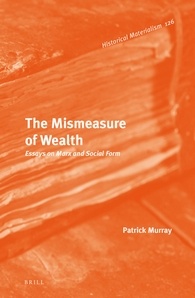Patrick Murray, Creighton University
The Mismeasure of Wealth: Essays on Marx and Social Form gathers Patrick Murray’s essays reinterpreting Marx and Marxian theory published since his Marx’s Theory of Scientific Knowledge (1988), along with a previously unpublished essay and an introduction. Murray’s essays concentrate on Marx the historical materialist, the investigator of historically specific social forms of wealth and labour. There is no production in general; the production of wealth always involves specific social forms and purposes that matter in many ways. Marx’s attention to the dynamics and far-reaching consequences of historically specific social forms – in particular those that are constitutive of the capitalist mode of production – sets him off from classical political economy and traditional Marxism. In probing Marx’s dialectical accounts of the commodity, value, money, surplus value, wage labour and capital, The Mismeasure of Wealth establishes Marx’s singular relevance for critical social theory today.
Biographical note
Readership
Table of contents
Acknowledgements
Introduction: Putting the Spotlight on Social Form and Purpose
PART I: THE ESSAYS
1: Value, Money and Capital in Hegel and Marx
2: Redoubled Empiricism: The Place of Social Form and Formal Causality in Marxian Theory
3: Things Fall Apart: Historical and Systematic Dialectics and the Critique of Political Economy
4: Marx’s ‘Truly Social’ Labour Theory of Value: Part I, Abstract Labour in Marxian Value Theory
5: Marx’s ‘Truly Social’ Labour Theory of Value: Part II, How is Labour that is under the Sway of Capital Actually Abstract?
6: The Grammar of Value: A Close Look at Marx’s Critique of Samuel Bailey
7: The Development of Marx’s Value-Form Theory in the Grundrisse: Reflections on Backhaus
8: The Necessity of Money: How Hegel Helped Marx to Surpass Ricardo’s Theory of Value
9: Money as Displaced Social Form: Why Value cannot be Independent of Price
10: The Social and Material Transformation of Production by Capital: Formal and Real Subsumption in Capital, Volume I
11: The Place of ‘The Results of the Immediate Production Process’ in Capital
12: Beyond the ‘Commerce and Industry’ Picture of Capital
13: Capital ‘Laid Bare’: How Hegel Helped Marx Surpass Ricardo’s Theory of Profit
14: The Illusion of the Economic: The Trinity Formula and the ‘Religion of Everyday Life’
PART TWO: CRITICAL ENGAGEMENTS
15: Avoiding Bad Abstractions: A Defence of Co-constitutive Value-Form Theory
16: The New Giant’s Staircase
17: In Defence of the ‘Third Thing Argument’: A Reply to James Furner’s ‘Marx’s Critique of Samuel Bailey’
18: Reply to Reuten
19: Comments on ‘The Four Drafts of Capital: Towards a new interpretation of the dialectical thought of Marx’ by Enrique Dussel and ‘Introduction to Dussel’ by Fred Moseley
Bibliography
Index

